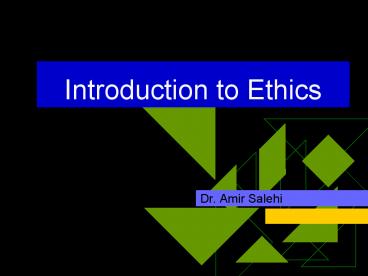Introduction to Ethics - PowerPoint PPT Presentation
1 / 16
Title:
Introduction to Ethics
Description:
Introduction to Ethics Dr. Amir Salehi Overview Defining Ethics Differences between Ethics and Psychology Ethical Issues Realism vs. Anti-realism in Ethics ... – PowerPoint PPT presentation
Number of Views:52
Avg rating:3.0/5.0
Title: Introduction to Ethics
1
Introduction to Ethics
- Dr. Amir Salehi
2
Overview
- Defining Ethics
- Differences between Ethics and Psychology
- Ethical Issues
- Realism vs. Anti-realism in Ethics
- Universalism vs. Relativism in Ethics
- Epistemology of Ethics
- Reasons for being moral
- Deontological Teleological Ethics
- Purpose of Ethics
- Methods used in Ethics
- Samples of questions asked in Ethics
3
What is Ethics?
- Defining Ethics
- Ethics, or moral Philosophy, is the study of
principles governing human actions in terms of
their goodness, badness, rightness and wrongness.
4
Differences between Psychology and Ethics
- Both are concerned with human action / behavior
5
Differences between Psychology and Ethics
- While Psychology is descriptive, Ethics is
normative. - Specifically ethics is interested in normative
issues for examining moral problems like
abortion, euthanasia, DNA research, genetic
manipulation and so on.
6
Ethical Issues
- Question
- What do all ethical issues have in common?
- Answer
- All ethical issues are problems that represent
conflict of values and/or interests
7
Realism vs. Anti-realism in Ethics
- Question Are there any standards or criteria
that ought to govern human behavior? - Realism Yes, moral truth exists independently
from human culture and existence - Anti-realism No, moral truth is man-made
(creation of a culture or society etc.)
8
Universalism vs. Relativism in Ethics
- Question Can the standards of morality be valid
for all humans with different cultural
backgrounds and different religious beliefs? - Universalism Yes, the standards of morality are
unchanging - Relativism No, the standards of morality are
subject to change. They depend on circumstances,
time and many other factors.
9
Epistemology of Ethics
- Question How can we know what the standards of
morality are?
10
Reasons for being moral
- Question Even if we know about the standards
of morality, why should we follow them,
especially when they dont seem to be in our own
best interest?
11
Deontological and Teleological Ethics
- Question In general, what is the characteristic
of all moral acts? - Deontological view Good motive or intention
- Teleological view Good outcome or result
12
Purpose of Ethics
- To develop ethical theories that can define and
justify moral duties - To solve ethical issues
13
Question What is the difference between morality
discussed in religion and the way morality is
discussed in Ethics?
14
Methods used in Ethics
- Critical thinking
- Rational / logical thinking
- Reflective thinking
- Systematic thinking
- Normative thinking
15
Sample of questions asked in Ethics
- What is a good person?
- What is a good life?
- (a life with a good purpose, or a life which is
simply more self-centered with pleasure and fun)
16
Quiz
- How is Ethics defined?
- What is the difference between Ethics and
Psychology? - What does an Ethical Issue represent?
- What is the difference between Realism
Anti-realism in Ethics? - Define Universalism Relativism in Ethics.
- Describe Deontological Teleological Ethics.
- What is the Purpose of Ethics?
- What is the method used in Ethics?





![READ [PDF] Medical Ethics: A Very Short Introduction (Very Short Intro PowerPoint PPT Presentation](https://s3.amazonaws.com/images.powershow.com/10133539.th0.jpg?_=20240918088)

























